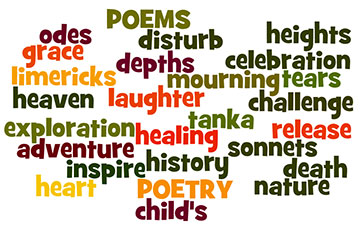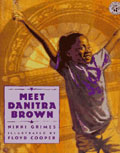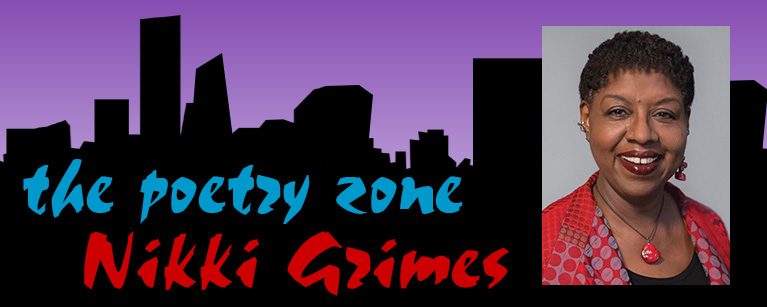 I love a good laugh. I laugh every day. I even make a point of giving others cause to chuckle, even if it’s sometimes at my own expense. Laughter is cleansing, healing, and necessary. God himself has a phenomenal sense of humor. He made us, didn’t he? Yes, laughter is to be appreciated, enjoyed.
I love a good laugh. I laugh every day. I even make a point of giving others cause to chuckle, even if it’s sometimes at my own expense. Laughter is cleansing, healing, and necessary. God himself has a phenomenal sense of humor. He made us, didn’t he? Yes, laughter is to be appreciated, enjoyed.
That said, I also know there’s more to life than laughter, and there’s more to children’s poetry than light verse. The two are not synonymous. One might not know that, though, judging from the narrow pool of children’s poetry books that are most often highlighted and recommended. The constant slant towards humorous verse leads me to cry out for diversity.
Big buzz-word, that! To be clear, I’m not talking about racial or cultural diversity in children’s poetry. That’s another discussion, entirely. No, I’m alluding to diversity as to type, topic, form. There’s a depth and breadth to children’s poetry that rarely gets its due, poetry specifically written for children that scales the heights of heaven, plumbs the depth of death, and graces all the notes in between. There are children’s poems that challenge, inspire, disturb. There are poems that create space in a child’s heart for the release of tears, as well as laughter—and both are healing. There are limericks, yes, but also odes, sonnets, tanka, and more. There are poetry collections that explore history and the men and women who’ve shaped it. There are collections that take readers for adventures on the high seas. There are poems that probe the minutia of Nature, and the vastness of outer space. This genre is deep, and wide!
As for cultural diversity, today’s offerings include children’s poetry by Native Americans, Palestinian Americans, Chinese Americans, Vietnamese Americans, Korean Americans, Latin Americans and, yes, African Americans. The field of children’s poetry is incredibly rich! Let’s make sure young readers have access to the full range available because it matters. Children benefit from seeing themselves in all guises, in all moods. Sometimes, when a child is having a difficult day, rather than a moment of laughter, he most needs a work that reflects his angst, a poem that shows him he is not alone, a poem that acknowledges both darkness and light in the world—even the world of a child.
 Poetry, all forms and facets of poetry, can be powerful. Dr. Joyce Briscoe discovered as much, many years ago, when she shared the—then—newly published Meet Danitra Brown with students at Clara Barton Elementary in California. Her so-called low-achieving students responded to the work to such an extent that, over time, she developed a sub-curriculum around Danitra Brown and found the material useful in motivating both reading and writing among students the system had written off. Soon, teachers throughout the district were following her lead. By the time I visited Clara Barton, I found poetry blossoming everywhere, and it was a thing of beauty.
Poetry, all forms and facets of poetry, can be powerful. Dr. Joyce Briscoe discovered as much, many years ago, when she shared the—then—newly published Meet Danitra Brown with students at Clara Barton Elementary in California. Her so-called low-achieving students responded to the work to such an extent that, over time, she developed a sub-curriculum around Danitra Brown and found the material useful in motivating both reading and writing among students the system had written off. Soon, teachers throughout the district were following her lead. By the time I visited Clara Barton, I found poetry blossoming everywhere, and it was a thing of beauty.
At Barton Elementary, each grade level was given a poem to memorize, and then a number of lesson plans revolved around that poem. One class was assigned the poem “Purple,” one of the humorous, bouncy poems of the collection, and certainly a favorite. However, one girl in this class told her teacher she preferred to memorize the poem “Sweet Blackberry”:
Danitra says my skin’s like
double chocolate fudge
cause I’m so dark.
The kids at school say it another way.
“You so black, girl,” they say,
“at night, people might think
you ain’t nothin’ but a piece o’ sky.”
I never cry, but inside
there’s a hurting place.
I make sure no one sees it on my face.
Then mama tells me,
“Next time, honey, you just say
The blacker the berry,
the sweeter the juice.”
Now that’s just what I do.
I sure wish I had told them that before.
Those kids don’t bother teasin’ me no more.
The teacher asked her why she preferred this poem, and she said, “Because whenever I read it, it makes me feel beautiful.” How’s that for power?
Children haven’t changed that much in the intervening years. They still have a range of emotions to play to. Poetry that tickles the funny bone should only be part of the equation. I encourage you to explore the poetry market, to journey up and down each aisle. Fill your cart with poetry that tickles the imagination, inspires awe, pauses on the subject of death, lingers over loss, reveals the cost of war. Add jaw-dropping poetry about the beauty of Nature, the wonders of science, the mysteries of history. Choose poetry that makes you cry and, yes, poetry that makes you laugh. Include them all in the poetry diet you feed your students. Trust each reader to discover his or her favorite dish. Make room for that to happen. Please.
When I first entered the children’s literary market, I felt like an endangered species. There didn’t seem to be many poets around. Today, however, the market is positively bursting with wonderful new poetic voices, and they all deserve to be heard, shared, read. My hope is that they will be, not only for the sake of the poets, but also for the sake of the students who need precisely the gift each poet brings.
Who are some of my favorite contemporary poets? The list is incredibly long, but here are a few—a precious few! —in the realm of children’s literature:
[ezcol_1half id=”” class=”” style=“”]Marilyn Nelson
Jane Yolen
Gary Soto
Joyce Sidman
Helen Frost
Naomi Shihab Nye
Carole Boston Weatherford
Laura Purdie Salas
Paul Janeczko
Janet Wong
Margarita Engles
Allan Wolf
Jack Prelutsky
Alice Schertle[/ezcol_1half] [ezcol_1half_end id=”” class=”” style=“”]J. Patrick Lewis
Pat Mora
Kristine O’Connell George
Joseph Bruchac
Georgia Heard
Sara Holbrook
Ralph Fletcher
George Ella Lyon
Jamie Adoff
Eloise Greenfield
April Halprin Wayland
Arnold Adoff
Rebecca Kai Dotlich
Lee Bennett Hopkins (the world’s most prolific anthologist of children’s poetry)[/ezcol_1half_end]
You can also enjoy the work of our US Children’s Poet Laureates:
Jack Prelutsky
Mary Ann Hoberman
J. Patrick Lewis
Kenn Nesbitt
Want a more comprehensive list? Hit me up on Facebook.



3 Responses
What a wonderful piece, Nikki!
It so needed to be said. I, too, love humorous poems,
but the emphasis on them is getting completely out of hand. I sometimes fear that kids will grow up thinking that is all there is to poetry. What a loss that would be.
Thanks so much for writing this. It did my heart good!
Patricia Hubbell
Love your Clara Barton Elem story, Nikki. So powerful. I am honored to be on your list and in such wonderful company. Thank you!
I just found this blog. I certainly wish I had this when I was still teaching. Now I’m writing and especially grateful to find it. Thanks for a wonderful post. I look forward to more and the time to read through your archives.